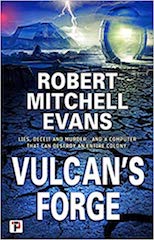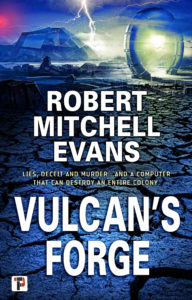.
My SF/Noir novel Vulcan’s Forge, published March 2020 by Flametree Press, is set on the distant

Flame Tree Publishing
and isolated human colony of Nocturnia, but the events of the story takes place centuries and centuries after the destruction of the Earth.
In the early 22nd century, after fusion power plants had become common, Artificial intelligences practical, and humanity has settlements, some quite large, throughout the inner solar system, a rouge brown dwarf is discovered with an orbit that will take through the solar system, disrupting and destroying the rocky inner planets.
Face with extinction humanity designs, constructs, and launches hundreds of automated solar sail arks. These arks do not carry crew or people but rather the egg and sperm of animals and people along with sophisticated A.I.s and the equipment to construct human colonies. Once an ark has reached its target system, should it have survived the centuries long voyage still functional, and provided there is a planet suitable for terrestrial life, the A.I. build the colony and its required infrastructure, and then utilizing artificial wombs, birth the first generation of human born on alien worlds, preserving humanity and numerous other Earth species.
Surprisingly cheap, due to plentiful fusion power, the resources of the solar system, and artificial intelligence each ark cost in today’s dollars about half a billion to build, equip, and launch. With the arks so affordable they are not the sole domain of governments and numerous cultures, religions, sub-cultures, and even a few individuals commission arks in a bid to save and ensure to continuity of their ways of life. There is even a couple of arks dedicated to making sure that out there among the star Texas continues to survive and thrive.
The colony of Nocturnia was settled by an ark commission by a group who fetishized Urban Americana of the 1950s. Believing that mid-twentieth century America represented some sort of ideal culture they programed the A.I.s of the ark to disseminate this as the colony’s sole culture. Naturally their ideas of what comprised an ‘ideal’ culture from one which more than a century and a half separated them were based more of myth and misunderstanding.
The novel picks up on Nocturnia as the third generation has come into its own and Jason Kessler, a man ill-suited to the social conformity of the 50s discovers that the colony harbors a deep and deadly secret.
As a traditionally published novel Vulcan’s Forge can be ordered from wherever books are sold. I am including links to San Diego premier specialty bookstore Mysterious Galaxy along with links to Amazon.
Mysterious Galaxy Paperback
Mysterious Galaxy eBook
Amazon Paperback
Amazon eBook


